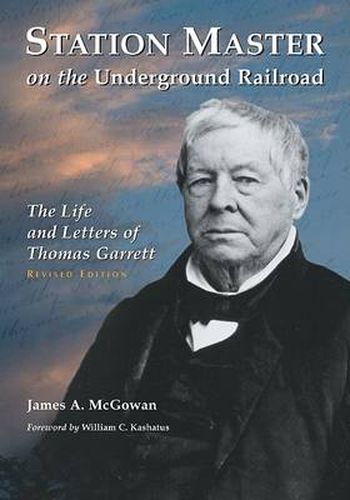Readings Newsletter
Become a Readings Member to make your shopping experience even easier.
Sign in or sign up for free!
You’re not far away from qualifying for FREE standard shipping within Australia
You’ve qualified for FREE standard shipping within Australia
The cart is loading…






This title is printed to order. This book may have been self-published. If so, we cannot guarantee the quality of the content. In the main most books will have gone through the editing process however some may not. We therefore suggest that you be aware of this before ordering this book. If in doubt check either the author or publisher’s details as we are unable to accept any returns unless they are faulty. Please contact us if you have any questions.
Thomas Garrett, a Quaker from Wilmington, Delaware, had a genial disposition unless provoked to defend his strong anti-slavery beliefs. Unlike most other white abolitionists who viewed slavery in more abstract and constitutional terms, Garrett, like free black abolitionists and the slaves themselves, saw slavery in very personal terms. He believed so strongly in the Underground Railroad and in helping slaves escape that he chafed under the Quaker belief in non-violence when force seemed to be the only way to win freedom for the slaves he was trying to help. When he died in 1871, Wilmington’s black community saluted him as ‘their Moses.’
Station Master on the Underground Railroad: The Life and Letters of Thomas Garrett
was an important work in antebellum reform when it was first published in 1977. Author James McGowan disputed earlier arguments that white abolitionists were unified in their opposition to slavery and that they were largely responsible for the success of the Underground Railroad while the escaped slaves were helpless and frightened passengers who took advantage of a well-organized network. The present volume has been revised to include new information on Garrett’s relationship with Harriet Tubman and the abolitionist newspaper editor William Lloyd Garrison. It also gives readers a new perspective on Thomas Garrett, recognizing his shortcomings as well as the uncompromising nature of his Quaker faith.
$9.00 standard shipping within Australia
FREE standard shipping within Australia for orders over $100.00
Express & International shipping calculated at checkout
Stock availability can be subject to change without notice. We recommend calling the shop or contacting our online team to check availability of low stock items. Please see our Shopping Online page for more details.
This title is printed to order. This book may have been self-published. If so, we cannot guarantee the quality of the content. In the main most books will have gone through the editing process however some may not. We therefore suggest that you be aware of this before ordering this book. If in doubt check either the author or publisher’s details as we are unable to accept any returns unless they are faulty. Please contact us if you have any questions.
Thomas Garrett, a Quaker from Wilmington, Delaware, had a genial disposition unless provoked to defend his strong anti-slavery beliefs. Unlike most other white abolitionists who viewed slavery in more abstract and constitutional terms, Garrett, like free black abolitionists and the slaves themselves, saw slavery in very personal terms. He believed so strongly in the Underground Railroad and in helping slaves escape that he chafed under the Quaker belief in non-violence when force seemed to be the only way to win freedom for the slaves he was trying to help. When he died in 1871, Wilmington’s black community saluted him as ‘their Moses.’
Station Master on the Underground Railroad: The Life and Letters of Thomas Garrett
was an important work in antebellum reform when it was first published in 1977. Author James McGowan disputed earlier arguments that white abolitionists were unified in their opposition to slavery and that they were largely responsible for the success of the Underground Railroad while the escaped slaves were helpless and frightened passengers who took advantage of a well-organized network. The present volume has been revised to include new information on Garrett’s relationship with Harriet Tubman and the abolitionist newspaper editor William Lloyd Garrison. It also gives readers a new perspective on Thomas Garrett, recognizing his shortcomings as well as the uncompromising nature of his Quaker faith.